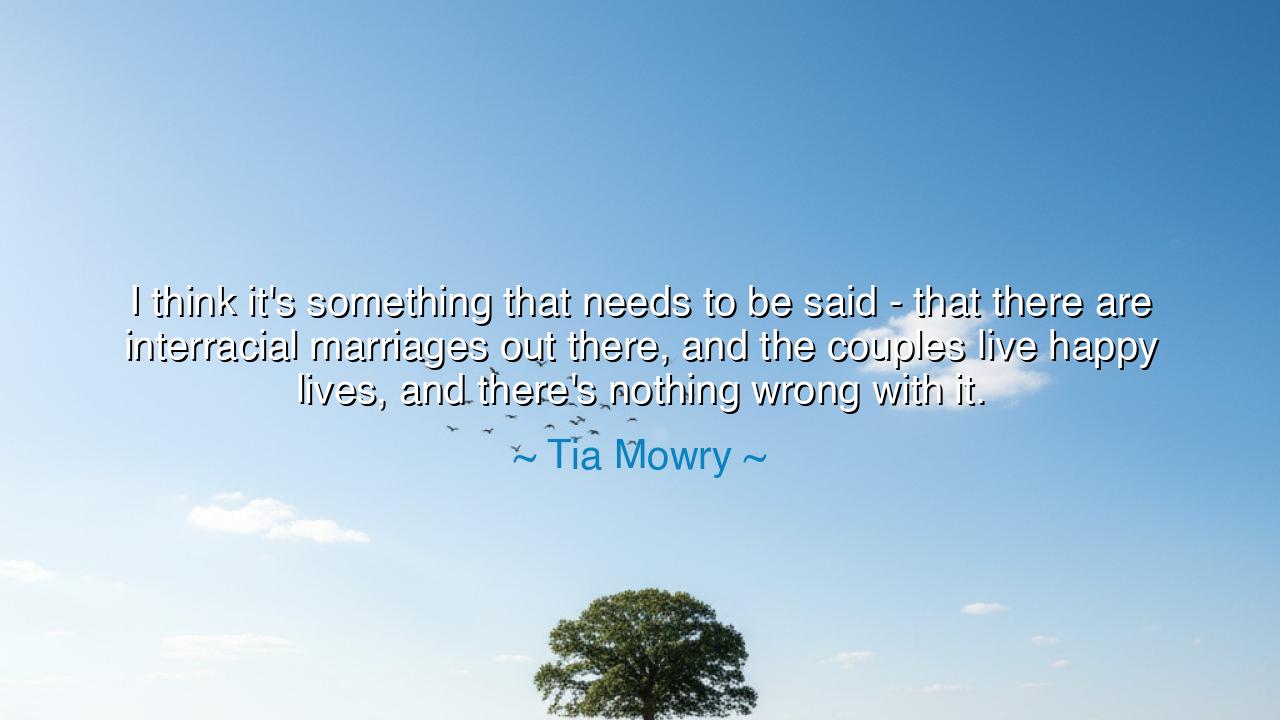
I think it's something that needs to be said - that there are
I think it's something that needs to be said - that there are interracial marriages out there, and the couples live happy lives, and there's nothing wrong with it.






“I think it’s something that needs to be said — that there are interracial marriages out there, and the couples live happy lives, and there’s nothing wrong with it.” These words from Tia Mowry, spoken with gentleness and truth, carry a courage that echoes far beyond their simplicity. For in them lies a timeless declaration: that love knows no color, that the human heart, when pure, transcends every boundary imposed by history, culture, or fear. Her words, though calm, strike against centuries of prejudice — they are a candle lit in a world still shadowed by misunderstanding.
In the days of the ancients, the philosophers spoke of harmony as the highest good. They said that when two different notes blend into one, music is born — and from diversity comes beauty. So it is with love. Interracial marriage is not a defiance of nature but a celebration of it — the meeting of different souls to create something new and radiant. When Mowry insists that “there’s nothing wrong with it,” she speaks against the ghosts of the past, against the centuries when love itself was treated as rebellion. Her words remind us that every human heart beats to the same rhythm, that love is not the privilege of a race but the inheritance of all.
To understand the power of her statement, we must remember the story of Mildred and Richard Loving, the couple whose very name foretold their mission. In 1958, they were arrested in Virginia for the crime of being married — she, a Black woman; he, a white man. Their union was deemed illegal, their love condemned. Yet they refused to yield. Their quiet dignity, their insistence that “we have the right to love who we want,” reached the Supreme Court in 1967 — and Loving v. Virginia became the case that struck down laws banning interracial marriage in the United States. They did not shout, they did not fight with violence; they simply lived in truth. Through them, the world was reminded that love itself is a form of justice.
Tia Mowry’s words carry the echo of that legacy. She speaks not from theory but from lived experience, as a woman who has walked that path — one who understands that even in modern times, love across racial lines still encounters whispers, doubts, and judgments. Yet she proclaims that happiness flourishes where authenticity reigns. Her statement is not only about marriage, but about freedom: the freedom to define one’s life not by society’s fears, but by the heart’s truth. This is the same freedom the prophets and poets have praised since time began — the freedom to love, to be, to exist without apology.
There is also humility in her tone, for she says, “I think it’s something that needs to be said.” How rare it is that something so simple — the happiness of two people — must still be defended! Her words remind us that even today, prejudice can hide beneath politeness, and bias can disguise itself as “tradition.” Yet truth, once spoken, has a way of dissolving the lies that cling to habit. Each declaration like hers is a stone cast into still water — its ripples reach far, awakening hearts that have grown numb.
From the viewpoint of wisdom, interracial love is not merely about race — it is a symbol of unity in diversity, of what humanity might become if it learns to honor difference instead of fearing it. It shows that harmony does not demand sameness, but the willingness to see the divine in what is unfamiliar. Love that bridges cultures and colors becomes a living parable: it teaches patience, empathy, and strength, for it must endure both internal trials and external prejudice. Those who love across divides are, in truth, healers of the human story.
So let this be the lesson drawn from Tia Mowry’s words: that love, when guided by respect and equality, is sacred — no matter who it joins. Let every generation speak these truths without hesitation, until such words no longer need to be said. Teach your children not to marvel that two people of different races can love one another, but to marvel that humanity once thought they could not. For the destiny of humankind is not separation but synthesis, not division but communion. And when hearts unite beyond the walls of color, they do more than love — they help restore the world to its rightful harmony.






AAdministratorAdministrator
Welcome, honored guests. Please leave a comment, we will respond soon